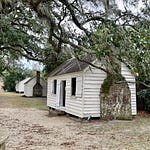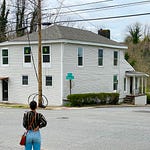Hello! I’m finally back with another sound bite from the road. It’s been a while - I hope this message finds you well.
In this audio newsletter I start by giving some brief updates about my project and talking about my recent trip to Charleston, South Carolina – a place that I will definitely return to in upcoming months.
I also share an informal, yet extremely informative interview with Erica Veal, Research Archivist and Interpretation Coordinator at Charleston’s Avery Research Center for African American History & Culture. Their mission is to collect, preserve and promote the history of the African Diaspora with a focus on the South Carolina Low Country.
This conversation gives insight into why I’m feeling grateful that my first biological ancestral trip ended up being in Charleston. It’s quickly becoming one of the most important places for me in the United States. It was the starting point for many of my enslaved ancestors and, as Erica shares, for much of African-American culture. And it is considered to still be one of the most Africanized cities/cultural areas in the US.
I’m so glad that my Uncle Robert and I stopped in to talk with Erica (you’ll briefly hear him during the interview). I learned so much, and it cemented why I need to keep learning about the Low Country, and head back to do more historical and genealogical research.
During the interview, Erica Veal shares:
The history of the Avery Research Center
Why the history of slavery is unique in the South Carolina Low Country
What makes Charleston’s culture (past and present) unique
How the local Gullah-Geechee culture has influenced both African-American and mainstream American culture.
Why the African-rooted Gullah-Geechee culture has had so much longevity
Tips and resources for researching enslaved ancestors from South Carolina
Please let me know what you think of the clip - I always appreciate feedback. You can reply to this email, or click the comment link below.
And if you’ve found your way to this newsletter but are not yet subscribed, let me help with that:
Resources Mentioned
Get Social










Share this post